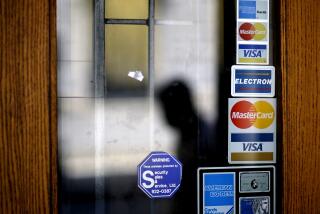Overdue bills on credit cards, consumer debt, drop to 2007 level
- Share via
WASHINGTON -- The portion of consumers with payments overdue on credit cards, auto loans and other debt dropped in the first three months of the year to the lowest level since 2007, according to the American Bankers Assn.
Overall, the percentage of consumer loans that were at least 30 days overdue dropped to 2.35% in the January-through-March period, down from 2.49% in the last quarter of 2012. It was the best performance since the second quarter of 2007, and put consumer delinquencies below the 15-year average of 2.4%, the group said.
At the worst point during the Great Recession and its aftermath, about 3.35% of consumer loans were overdue.
“Consumers have done a remarkable job getting their finances under control,” said James Chessen, chief economist for the ABA. “Overall debt levels have declined dramatically and savings continues to grow. This means many consumers have more capacity to absorb a financial shock, and that’s a good place to be.”
The group’s quarterly Consumer Credit Delinquency Bulletin tracks overdue payments in 11 categories. Ten of those categories showed improvements in the first quarter, which Chessen said was remarkable given the sharp increase in gas prices in the first three months of the year.
Consumers showed great improvement on credit card debt. The percentage of overdue credit card payments fell to 3.08% in the first quarter from 3.17%. It was the lowest level since 2001. In mid-2009, about 5% of all credit card accounts were delinquent.
Delinquencies rose only in home equity lines of credit, to 1.78% of all accounts from 1.69% in the previous quarter. Chessen attributed the increase to the continued fallout from the housing crisis.
“It will be many quarters before delinquencies on home equity loans get back to anything close to normal,” he said.
Chessen expects delinquency rates to continue to drop, but not as dramatically as in the last two quarters.
“We’ve moved back to historical norms now and further improvement could be hard to achieve,” he said. “The economy has slowed recently and uncertainty remains high”
ALSO:
Eurozone unemployment hits new record in May
California lawmakers pass historic foreclosure protections
U.S. manufacturing falls for first time in nearly three years
More to Read
Inside the business of entertainment
The Wide Shot brings you news, analysis and insights on everything from streaming wars to production — and what it all means for the future.
You may occasionally receive promotional content from the Los Angeles Times.











